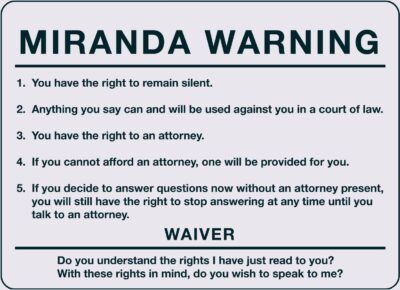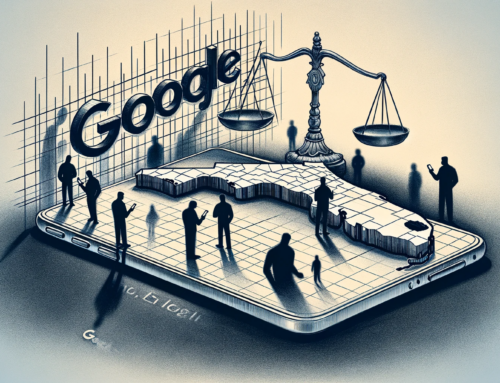What are your Miranda rights?
Miranda rights are a set of rights read to suspects in police custody in Miami and the rest of the United States before they are questioned. The phrase “Miranda rights” comes from the last name of the man, Ernesto Miranda, who appealed his case to the U.S. Supreme Court, resulting in the landmark criminal law case Miranda v. Arizona, in which the Supreme Court held that suspects who are in custody must be informed of their Fifth and Sixth Amendment rights before being interrogated if their statements are to be used against them in a criminal case.  Miranda rights include the right to remain silent, the right to an attorney, and the right to have an attorney appointed if the suspect cannot afford one. Miranda rights also inform suspects that anything they say can be used as evidence against them in court. The purpose of Miranda rights is to protect the suspect’s Fifth Amendment rights against self-incrimination and to ensure that any statements they make are voluntary.
Miranda rights include the right to remain silent, the right to an attorney, and the right to have an attorney appointed if the suspect cannot afford one. Miranda rights also inform suspects that anything they say can be used as evidence against them in court. The purpose of Miranda rights is to protect the suspect’s Fifth Amendment rights against self-incrimination and to ensure that any statements they make are voluntary.
What is the right to remain silent?
The right to remain silent is a fundamental constitutional right that is protected by the Fifth Amendment to the U.S. Constitution. The right to remain silent allows individuals to refuse to answer questions or make statements to the police or other government officials without fear of punishment or retaliation. This means that if you are in police custody or are being questioned by the police, you have the right to refuse to answer any questions or make any statements without the risk of being penalized for doing so. The right to remain silent protects individuals from self-incrimination and ensures that their statements are voluntary and not resulting from coercion or improper police tactics.
Is a law enforcement officer required to read the Miranda warning to a suspect before questioning them?
The United States Supreme Court has held that law enforcement officers must read suspects’ Miranda rights before questioning them if there is a “custodial interrogation.” Miranda rights, also known as a Miranda warning, are a set of legal rights read to suspects to inform them of their constitutional rights, such as the right to remain silent and an attorney. The purpose of Miranda rights is to protect the suspect’s Fifth Amendment rights against self-incrimination. Miranda rights must be read to a suspect before police questioning begins for the suspect’s statements to be admissible as evidence at trial.
What does “in custody” mean for purposes of Miranda rights?
The requirement to read suspects’ Miranda rights only applies when they are “in custody.” This means that the suspect has been arrested or is otherwise detained by the officer and is not free to leave. If a suspect is free to leave, the police are not required to read their Miranda rights before asking them questions. They must only read them to a suspect if there is an in-custody interrogation.
How do you invoke Miranda rights?
To invoke your Miranda rights, you need to inform the police that you are invoking your right to remain silent and your right to an attorney. This can be done by stating something like “I invoke my right to remain silent” or “I want to speak to an attorney before answering any questions.” Once you have invoked your Miranda rights, the police must stop interrogating you and provide you with access to an attorney if you request one. It is important to note that you can invoke your Miranda rights anytime during an interrogation, even if you have already started answering questions. However, if you do not clearly and unambiguously invoke your Miranda rights, the police are not required to stop questioning you, and any statements you make may be used as evidence against you in court.
Are all statements that I make to the police covered by Miranda?
No, not all statements you make to the police are covered by Miranda. Miranda rights only apply to statements that are made by a suspect who is in custody and is being questioned by officers. This means that any statements the suspect makes during an interrogation are covered by Miranda and must be voluntary to be admissible as evidence in a criminal trial. Statements made by the suspect outside of interrogation, such as when the suspect is being transported to the police station or is in custody but is not being questioned, are not covered by Miranda and do not have to meet the exact requirements for admissibility in court.
How do you waive your rights?
To make a valid waiver of your Miranda rights, you must voluntarily, knowingly, and intelligently give up your right to remain silent and your right to an attorney. This can be done by making a statement or taking another action indicating that you voluntarily give up your Miranda rights. For example, you might say, “I understand my rights, and I am willing to answer questions without an attorney present.” For your waiver of Miranda rights to be valid, you must fully understand your rights and the consequences of giving them up, and you must voluntarily choose to do so. If you have any questions or concerns about your Miranda rights, it is vital to consult an attorney before deciding whether to waive them.
What happens if an officer doesn’t read my rights before they start questioning me but gives me the Miranda warnings after I’ve already started answering questions?
If a police officer does not read your Miranda rights before questioning you but gives you the Miranda warnings after you have already started answering questions, any incriminating statements you made before the officer read you your rights may not be admissible as evidence in court. This is because the purpose of Miranda rights is to protect your constitutional rights against self-incrimination. If you were not informed of those rights before questioning, you may not have been aware of your rights and may have made statements that you would not have made if you had been aware of your rights. In this situation, it is up to the prosecution to prove that your statements were voluntary and not the result of coercion or improper police tactics, which can be challenging. Therefore, it is generally in the best interests of the police to read a suspect their Miranda rights before questioning them to avoid any potential problems with the admissibility un-Mirandized statements in a criminal case.
Are specific words or language required when an officer reads me my rights?
No specific wording must be used when reading the Miranda rights to a suspect. However, the officer must convey the essential information contained in the Miranda rights, which includes the suspect’s right to remain silent, the right to an attorney, and the fact that anything the suspect says can be used as evidence against them in court. The officer should also clarify to the suspect that they have the right to an attorney and that one will be appointed if they cannot afford an attorney. As long as the essential information contained in the Miranda rights is conveyed to the suspect, it does not matter what specific words are used.
“You have the right to remain silent. Anything you say can and will be used against you in a court of law. You have the right to speak to an attorney, and to have an attorney present during any questioning. If you cannot afford a lawyer, one will be provided for you at government expense.”
If the officer didn’t read my rights, does that mean I wasn’t under arrest?
The fact that the police did not read you your Miranda rights does not necessarily mean that you were not under arrest. The requirement to read a suspect’s Miranda rights only applies in specific situations, such as when the suspect is in custody and interrogated by the police. For example, if officers question you at the police station after you have been arrested or if you are otherwise not free to leave. If the police are not interrogating you and you are not in custody or under arrest, they are not required to read you your Miranda rights.
If an officer didn’t read my rights, does that mean the case will be dismissed?
If a police officer did not read your Miranda rights before questioning you, that does not necessarily mean that the case against you will be dismissed. The failure to read a suspect their Miranda rights only affects the admissibility of their statements as evidence in court. This means that if you made any statements to the police during an interrogation without being read your Miranda rights, those statements may not be able to be used as evidence against you in court. However, the prosecution may still have other evidence against you, such as physical evidence or witness testimony, that they can use to build their case. Therefore, failing to read your Miranda rights does not necessarily mean that the case against you will be dismissed. It is important to consult with an attorney if you have any questions or concerns about your rights and the potential impact on your case.
Have Questions About Your Miranda Rights?
If you are facing criminal charges or are under criminal investigation in Miami, you need the legal counsel of an experienced criminal defense lawyer before you face police interrogation.
Contact our law office today to speak with a criminal defense attorney with the experience and knowledge to give you the legal advice you need.
This website is designed for general information only. The information presented at this site should not be construed to be formal legal advice or the formation of an attorney client relationship with our Miami law office.








